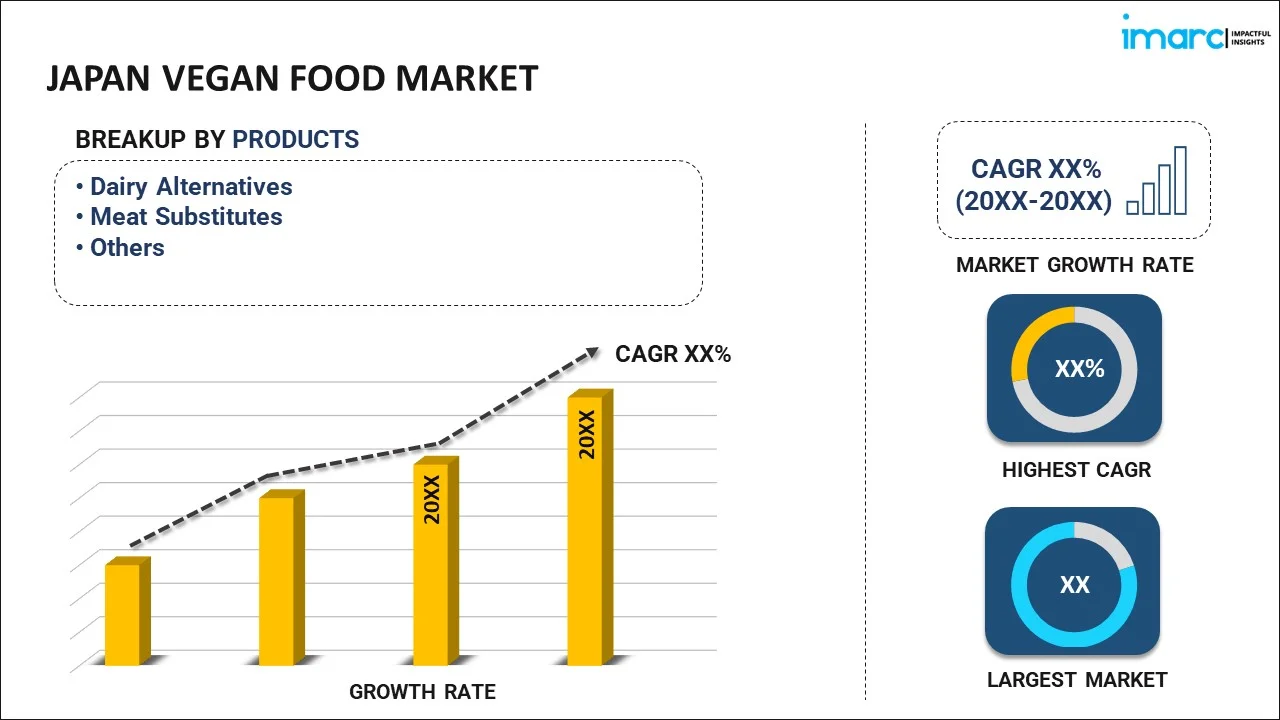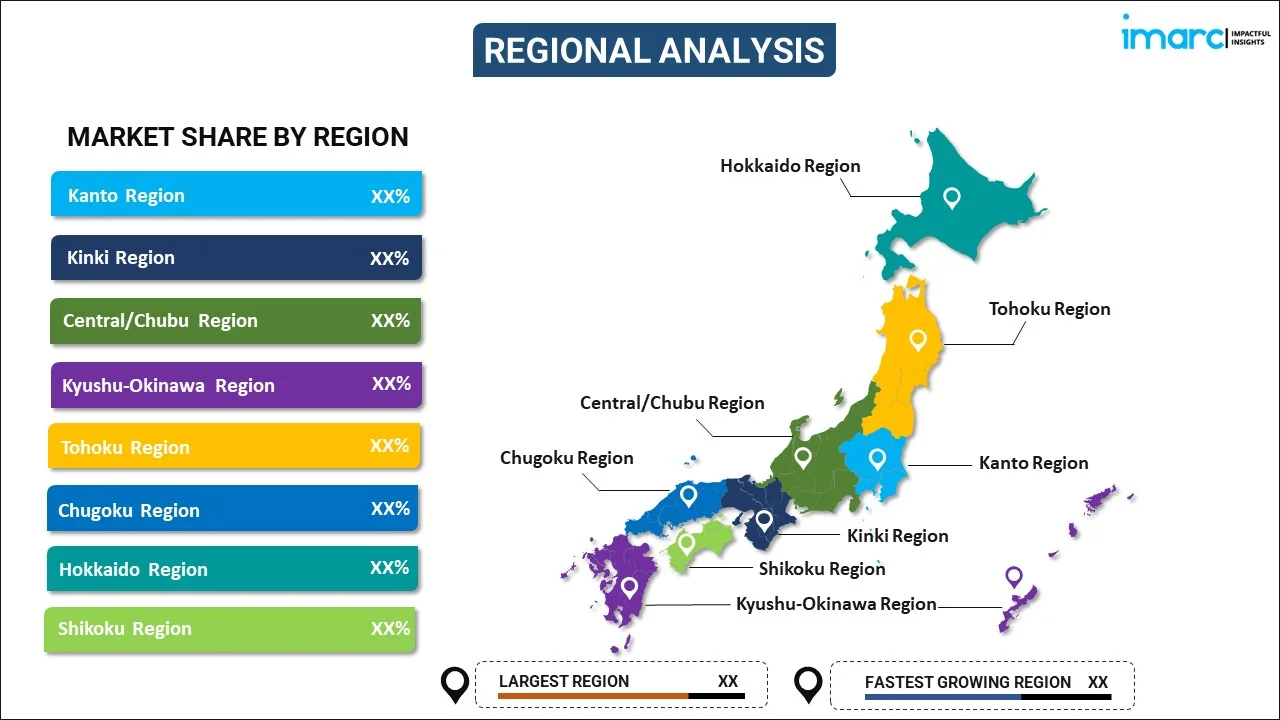
Japan Vegan Food Market Report by Product (Dairy Alternatives, Meat Substitutes, and Others), Source (Almond, Soy, Oats, Wheat, and Others), Distribution Channel (Supermarkets and Hypermarkets, Convenience Stores, Specialty Stores, Online Stores, and Others), and Region 2025-2033
Market Overview:
The Japan vegan food market size reached USD 1.2 Billion in 2024. Looking forward, IMARC Group expects the market to reach USD 2.7 Billion by 2033, exhibiting a growth rate (CAGR) of 9.7% during 2025-2033. The increasing adoption of vegan diets, the introduction of innovative products, the availability of a variety of food options in restaurants, cafes, and supermarkets and the growing influence of celebrity and social media influence represent some of the key factors driving the market.
|
Report Attribute
|
Key Statistics
|
|---|---|
|
Base Year
|
2024 |
|
Forecast Years
|
2025-2033
|
|
Historical Years
|
2019-2024
|
| Market Size in 2024 | USD 1.2 Billion |
| Market Forecast in 2033 | USD 2.7 Billion |
| Market Growth Rate (2025-2033) | 9.7% |
Vegan food refers to food items and dishes that are entirely plant-based and do not include any animal-derived ingredients. Veganism is a dietary and lifestyle choice that excludes all animal products, including meat, poultry, seafood, dairy, eggs, and other animal-derived substances such as honey. These items are sourced from plant-based ingredients, which include fruits, vegetables, grains, legumes, nuts, seeds, and plant-based alternatives to traditional animal products. Vegan food options have expanded significantly in recent years, with the development of plant-based alternatives to traditional animal products. Vegan food can be prepared in a wide variety of dishes, ranging from salads, soups, and sandwiches to pasta, curries, and desserts. As veganism gains popularity, there is a growing emphasis on creating flavorful and nutritious plant-based meals that cater to a diverse range of tastes and dietary preferences. As a result, Japan vegan food market is experiencing significant growth, driven by a combination of factors that reflect changing consumer preferences, health consciousness, ethical considerations, and sustainability concerns.
Japan Vegan Food Market Trends:
A growing awareness of health and wellness is a key driver of the vegan food market in Japan. Consumers are increasingly seeking healthier dietary options to improve their well-being and prevent lifestyle-related health issues. Plant-based diets, rich in fruits, vegetables, whole grains, and legumes, are associated with various health benefits, including reduced risk of chronic diseases, improved digestion, and weight management. In addition, consumers in Japan are becoming more conscious of the ethical and environmental implications of their food choices. The negative impacts of animal agriculture on animal welfare and the environment are prompting many individuals to adopt vegan diets to reduce their carbon footprint and contribute to more sustainable food systems. Besides, the concept of flexitarianism, which involves reducing meat consumption while incorporating more plant-based foods into the diet, is gaining traction in Japan. As individuals seek a balance between health, taste, and environmental considerations, they are embracing plant-based foods to reduce their overall meat consumption. Moreover, the availability of a wider variety of vegan food options in restaurants, cafes, and supermarkets is driving consumer interest and adoption. Restaurants and food establishments are increasingly offering plant-based menus or vegan alternatives, making it easier for individuals to choose vegan options while dining out, representing another growth-inducing factor. Furthermore, influencers, celebrities, and health advocates who promote vegan diets on social media and other platforms have contributed to raising awareness and driving interest in vegan food. Their endorsements and personal experiences inspire others to explore plant-based eating, contributing to the market's growth across the country.
Japan Vegan Food Market Segmentation:
IMARC Group provides an analysis of the key trends in each segment of the Japan vegan food market report, along with forecasts at the country level for 2025-2033. Our report has categorized the market based on product, source, distribution channel.
Product Insights:

- Dairy Alternatives
- Cheese
- Dessert
- Snacks
- Others
- Meat Substitutes
- Tofu
- Texturized Vegetable Protein (TVP)
- Seiten
- Quorn
- Others
- Others
The report has provided a detailed breakup and analysis of the market based on the product. This includes dairy alternatives (cheese, dessert, snacks, and others); meat substitutes (tofu, texturized vegetable protein (TVP), seiten, Quorn, and others), and others.
Source Insights:
- Almond
- Soy
- Oats
- Wheat
- Others
The report has provided a detailed breakup and analysis of the market based on the source. This includes almond, soy, oats, wheat, and others.
Distribution Channel Insights:
- Supermarkets and Hypermarkets
- Convenience Stores
- Specialty Stores
- Online Stores
- Others
The report has provided a detailed breakup and analysis of the market based on the distribution channel. This includes supermarkets and hypermarkets, convenience stores, specialty stores, online stores, and others.
Regional Insights:

- Kanto Region
- Kinki Region
- Central/ Chubu Region
- Kyushu-Okinawa Region
- Tohoku Region
- Chugoku Region
- Hokkaido Region
- Shikoku Region
The report has also provided a comprehensive analysis of all the major regional markets, which include Kanto Region, Kinki Region, Central/ Chubu Region, Kyushu-Okinawa Region, Tohoku Region, Chugoku Region, Hokkaido Region, and Shikoku Region.
Competitive Landscape:
The report has also provided a comprehensive analysis of the competitive landscape in the market. Competitive analysis such as market structure, key player positioning, top winning strategies, competitive dashboard, and company evaluation quadrant has been covered in the report. Also, detailed profiles of all major companies have been provided.
Japan Vegan Food Market Report Coverage:
| Report Features | Details |
|---|---|
| Base Year of the Analysis | 2024 |
| Historical Period | 2019-2024 |
| Forecast Period | 2025-2033 |
| Units | Billion USD |
| Scope of the Report | Exploration of Historical and Forecast Trends, Industry Catalysts and Challenges, Segment-Wise Historical and Predictive Market Assessment:
|
| Products Covered |
|
| Sources Covered | Almond, Soy, Oats, Wheat, Others |
| Distribution Channels Covered | Supermarkets and Hypermarkets, Convenience Stores, Specialty Stores, Online Stores, Others |
| Regions Covered | Kanto Region, Kinki Region, Central/ Chubu Region, Kyushu-Okinawa Region, Tohoku Region, Chugoku Region, Hokkaido Region, Shikoku Region |
| Customization Scope | 10% Free Customization |
| Post-Sale Analyst Support | 10-12 Weeks |
| Delivery Format | PDF and Excel through Email (We can also provide the editable version of the report in PPT/Word format on special request) |
Key Questions Answered in This Report:
- How has the Japan vegan food market performed so far and how will it perform in the coming years?
- What has been the impact of COVID-19 on the Japan vegan food market?
- What is the breakup of the Japan vegan food market on the basis of product?
- What is the breakup of the Japan vegan food market on the basis of source?
- What is the breakup of the Japan vegan food market on the basis of distribution channel?
- What are the various stages in the value chain of the Japan vegan food market?
- What are the key driving factors and challenges in the Japan vegan food market?
- What is the structure of the Japan vegan food market and who are the key players?
- What is the degree of competition in the Japan vegan food market?
Key Benefits for Stakeholders:
- IMARC’s report offers a comprehensive quantitative analysis of various market segments, historical and current market trends, market forecasts, and dynamics of the Japan vegan food market from 2019-2033.
- The research study provides the latest information on the market drivers, challenges, and opportunities in the Japan vegan food market.
- Porter's five forces analysis assist stakeholders in assessing the impact of new entrants, competitive rivalry, supplier power, buyer power, and the threat of substitution. It helps stakeholders to analyze the level of competition within the Japan vegan food industry and its attractiveness.
- Competitive landscape allows stakeholders to understand their competitive environment and provides an insight into the current positions of key players in the market.
Need more help?
- Speak to our experienced analysts for insights on the current market scenarios.
- Include additional segments and countries to customize the report as per your requirement.
- Gain an unparalleled competitive advantage in your domain by understanding how to utilize the report and positively impacting your operations and revenue.
- For further assistance, please connect with our analysts.
 Request Customization
Request Customization
 Speak to an Analyst
Speak to an Analyst
 Request Brochure
Request Brochure
 Inquire Before Buying
Inquire Before Buying




.webp)




.webp)












